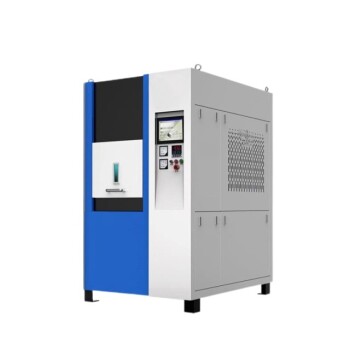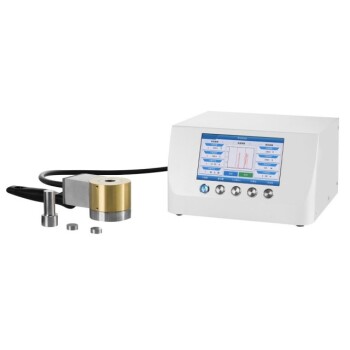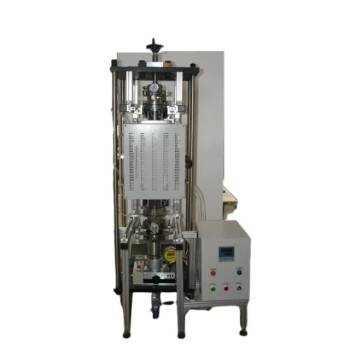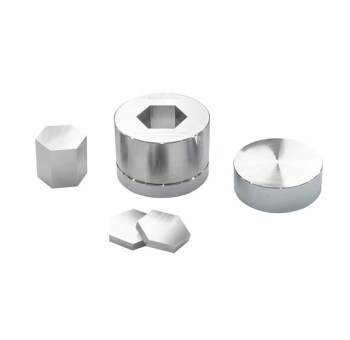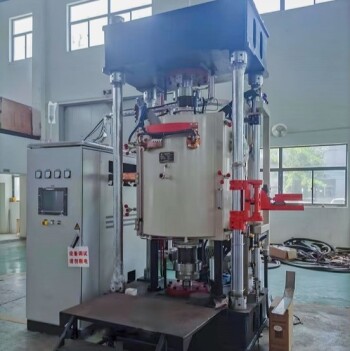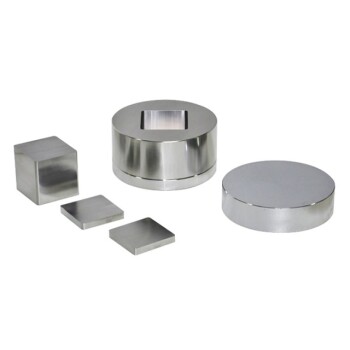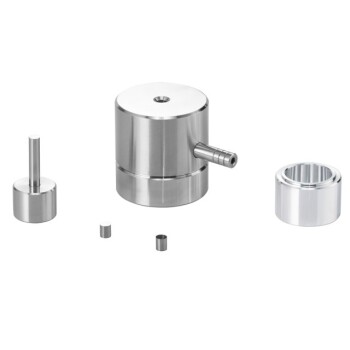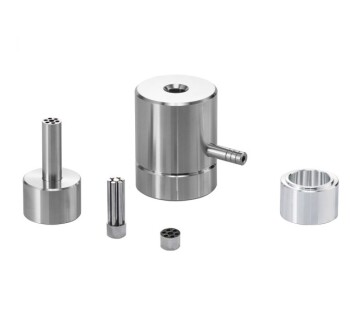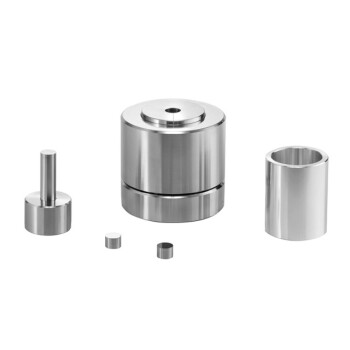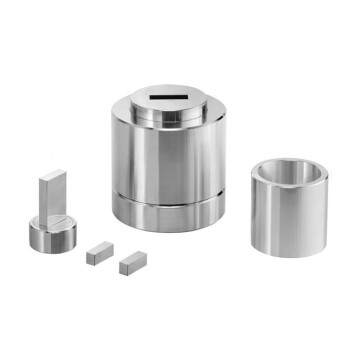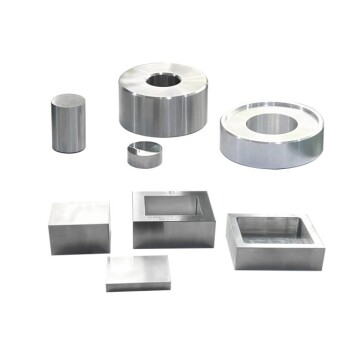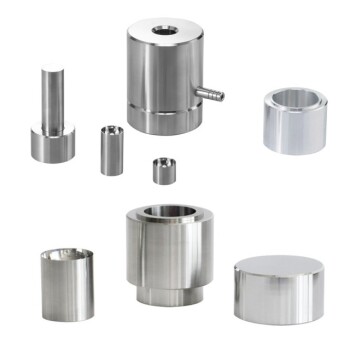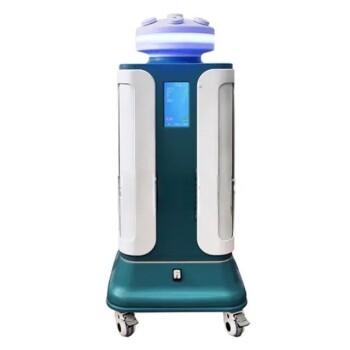放电等离子烧结(SPS)中使用的压力并非一个单一的固定值,而是一个关键且可调节的工艺参数。对于大多数材料和应用,单轴压力通常在 30 至 100 兆帕(MPa)的范围内。这种压力与快速电阻加热协同作用,比传统烧结方法更有效地实现致密化。
核心挑战不在于找到一个单一的正确压力,而在于理解其作用。SPS中的压力是补充热能的主要机械力,选择合适的水平需要在驱动致密化、保持微观结构和尊重设备物理限制之间取得审慎的平衡。
压力在SPS中的基本作用
压力不是一个被动变量;它是固结过程的积极驱动力。它与脉冲直流电流产生的高温协同作用,将松散的粉末转化为致密的固体。
驱动颗粒固结
在循环的最初阶段,压力促进颗粒重排。它分解软团聚体,并迫使单个颗粒排列得更紧密,在显著加热发生之前就大大降低了初始孔隙率。
实现塑性变形
随着温度升高,材料的屈服强度降低。施加的压力迫使现在具有延展性的颗粒在其接触点发生变形。这种塑性流动是SPS中的主要机制,它物理性地闭合了颗粒间的空隙,从而导致快速致密化。
增强质量传输
由施加压力产生的应力梯度增加了扩散过程(如晶界扩散和体扩散)的驱动力。这意味着原子更容易移动以填充剩余的微观孔隙,这是实现接近完全理论密度的关键过程。
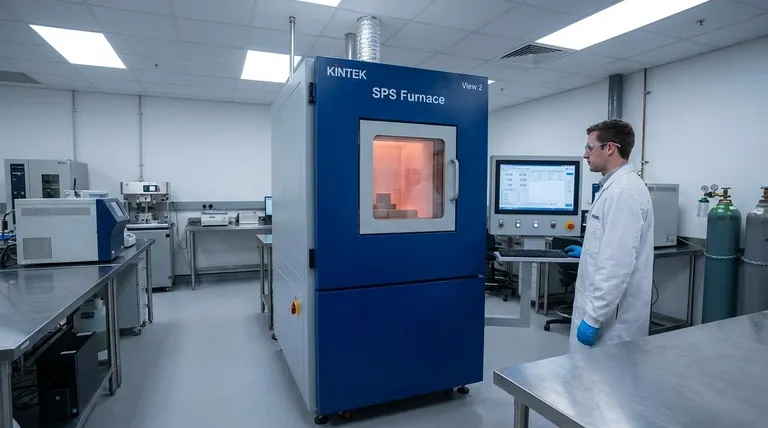
决定最佳压力的关键因素
“正确”的压力完全取决于您的材料、目标和设备。盲目应用标准值将导致次优结果。
材料类型:脆性 vs. 韧性
硬而脆的材料,如陶瓷(例如,碳化硅、碳化硼),对塑性流动具有高抵抗力。它们通常需要更高的压力(70-100 MPa或更高)才能诱导必要的变形以实现致密化。
相反,铝或铜等韧性材料容易变形。它们通常可以在较低到中等压力(30-60 MPa)下完全致密化,而无需极高温度。
所需微观结构:密度 vs. 晶粒尺寸
SPS的主要优点之一是能够在抑制晶粒长大的同时生产致密材料。使用更高的压力通常可以在更低的温度或更短的时间内实现致密化。这是保持细晶粒或纳米结构微观结构的关键策略。
设备限制:石墨模具
绝大多数SPS实验都使用石墨模具和冲头进行。标准等级的石墨在高温下具有有限的抗压强度,这通常将可用压力限制在100-120 MPa左右。超过此限制可能会导致模具灾难性失效,从而损坏设备并毁坏样品。
理解权衡:压力困境
选择压力设置涉及平衡相互竞争的因素。在一个方面有帮助的,在另一个方面可能有害。
使用过大压力的风险
施加过大的压力可能导致几个问题。最直接的是模具失效。此外,力的单轴性质可能产生各向异性微观结构,其中晶粒被拉长或优先取向,导致机械性能随方向变化。对于脆性粉末,过于激进地施加压力也可能导致样品开裂。
使用过小压力的后果
压力不足是导致结果不佳的常见原因。如果压力过低,可能不足以诱导塑性流动和颗粒重排以闭合所有孔隙。这会导致样品最终密度低,从而导致机械性能差。为了弥补,您可能被迫使用更高的温度,这增加了不希望的晶粒长大的风险。
为您的应用选择合适的压力
没有通用的公式,但根据您的主要目标有明确的指导方针。从类似材料的文献中获取基线,然后根据您的具体目标进行优化。
- 如果您的主要重点是在硬陶瓷中实现最大密度:从模具能力的上限开始(例如,80-100 MPa),以确保克服材料固有的致密化阻力。
- 如果您的主要重点是保持纳米结构:使用能实现固结的最低压力(通常为30-50 MPa),并配合非常高的加热速率和最短的保温时间,以防止晶粒粗化。
- 如果您的主要重点是烧结韧性金属:中等压力(例如,40-60 MPa)通常足以诱导塑性流动并实现完全致密化,而无需极高温度。
最终,压力是您与温度协同作用的关键杠杆,用于精确设计材料的最终状态。
总结表:
| 材料类型 | 典型压力范围 (MPa) | 主要目标 |
|---|---|---|
| 脆性陶瓷(例如,SiC) | 70 - 100+ | 最大密度 |
| 韧性金属(例如,Al, Cu) | 30 - 60 | 完全致密化 |
| 纳米结构材料 | 30 - 50 | 抑制晶粒长大 |
准备好优化您的SPS工艺了吗?
选择合适的压力只是难题的一部分。KINTEK专注于实验室设备和耗材,提供您掌握放电等离子烧结所需的专业知识和工具。无论您是使用先进陶瓷、金属还是纳米材料,我们都能帮助您实现卓越的致密化和精确的微观结构控制。
立即联系我们,讨论您的具体应用,并了解我们的解决方案如何提升您的研发工作。通过我们的联系表格与我们取得联系——让我们共同开创材料的未来。
图解指南

